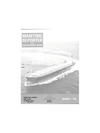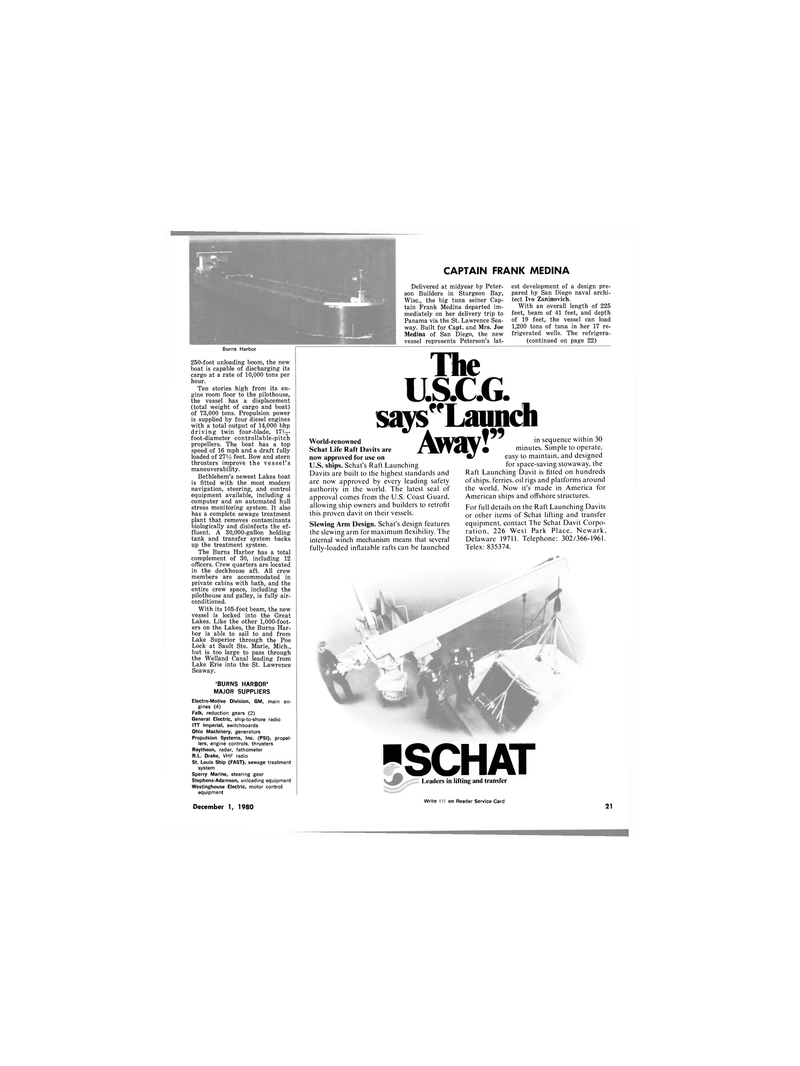
Page 19: of Maritime Reporter Magazine (December 1980)
Read this page in Pdf, Flash or Html5 edition of December 1980 Maritime Reporter Magazine
CAPTAIN FRANK MEDINA
Delivered at midyear by Peter- son Builders in Sturgeon Bay,
Wise., the big tuna seiner Cap- tain Frank Medina departed im- mediately on her delivery trip to
Panama via the St. Lawrence Sea- way. Built for Capt. and Mrs. Joe
Medina of San Diego, the new vessel represents Peterson's lat- est development of a design pre- pared by San Diego naval archi- tect Ivo Zaninovich.
With an overall length of 225 feet, beam of 41 feet, and depth of 19 feet, the vessel can load 1,200 tons of tuna in her 17 re- frigerated wells. The refrigera- (continued on page 22)
Burns Harbor 250-foot unloading boom, the new boat is capable of discharging its cargo at a rate of 10,000 tons per hour.
Ten stories high from its en- gine room floor to the pilothouse, the vessel has a displacement (total weight of cargo and boat) of 73,000 tons. Propulsion power is supplied by four diesel engines with a total output of 14,000 bhp driving twin four-blade, 17V2- foot-diameter controllable-pitch propellers. The boat has a top speed of 16 mph and a draft fully loaded of 27Vo feet. Bow and stern thrusters improve the vessel's maneuverability.
Bethlehem's newest Lakes boat is fitted with the most modern navigation, steering, and control equipment available, including a computer and an automated hull stress monitoring system. It also has a complete sewage treatment plant that removes contaminants biologically and disinfects the ef- fluent. A 30,000-gallon holding tank and transfer system backs up the treatment system.
The Burns Harbor has a total complement of 30, including 12 officers. Crew quarters are located in the deckhouse aft. All crew members are accommodated in private cabins with bath, and the entire crew space, including the pilothouse and galley, is fully air- conditioned.
With its 105-foot beam, the new vessel is locked into the Great
Lakes. Like the other 1,000-foot- ers on the Lakes, the Burns Har- bor is able to sail to and from
Lake Superior through the Poe
Lock at Sault Ste. Marie, Mich., but is too large to pass through the Welland Canal leading from
Lake Erie into the St. Lawrence
Seaway. 'BURNS HARBOR'
MAJOR SUPPLIERS
Electro-Motive Division, GM, main en- gines (4)
Falk, reduction gears (2)
General Electric, ship-to-shore radio
ITT Imperial, switchboards
Ohio Machinery, generators
Propulsion Systems, Inc. (PSI), propel- lers, engine controls, thrusters
Raytheon, radar, fathometer
R.L. Drake, VHF radio
St. Louis Ship (FAST), sewage treatment system
Sperry Marine, steering gear
Stephens-Adamson, unloading equipment
Westinghouse Electric, motor control equipment
December 1, 1980
The US.C.G. says" Launch Away!"
World-renowned
Schat Life Raft Davits are now approved for use on
U.S. ships. Schat's Raft Launching
Davits are built to the highest standards and are now approved by every leading safety authority in the world. The latest seal of approval comes from the U.S. Coast Guard, allowing ship owners and builders to retrofit this proven davit on their vessels.
Slewing Arm Design. Schat's design features the slewing arm for maximum flexibility. The internal winch mechanism means that several fully-loaded inflatable rafts can be launched in sequence within 30 minutes. Simple to operate, easy to maintain, and designed for space-saving stowaway, the
Raft Launching Davit is fitted on hundreds of ships, ferries, oil rigs and platforms around the world. Now it's made in America for
American ships and offshore structures.
For full details on the Raft Launching Davits or other items of Schat lifting and transfer equipment, contact The Schat Davit Corpo- ration, 226 West Park Place, Newark,
Delaware 19711. Telephone: 302/366-1961.
Telex: 835374. •SCHAT
Leaders in lifting and transfer
Write 257 on Reader Service Card 21

 18
18

 20
20
